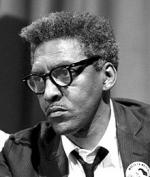Disable ads!
Bayard Rustin
Part of a series on Socialism in the United States History Utopian socialism New Harmony Brook Farm Oneida Community Icarians Bishop Hill Commune Looking Backward Progressive Era St. Louis Commune 1912 Lawrence Textile Strike Labor unionisation Women's suffrage Haymarket massacre May Day Repression and persecution Espionage Act of 1917 First Red Scare American Defense Society American Protective League Seattle General Strike The Communist Party USA and African Americans Communists in the United States Labor Movement (1919–37) Communists in the United States Labor Movement (1937–50) McCarthyism Smith Act / Smith Act trials John Birch Society Civil Rights / Anti-imperialism New Left War on Poverty Great Society Poor People's Campaign COINTELPRO Parties and organizations Active Committees of Correspondence for Democracy and Socialism Communist Party Democratic Socialists of America Freedom Road Socialist Organization Freedom Socialist Party Industrial Workers of the World International Socialist Organization Party for Socialism and Liberation Peace and Freedom Party Progressive Labor Party Revolutionary Communist Party Socialist Action Socialist Alternative Socialist Equality Party Socialist Organizer Socialist Party Socialist Workers Party Spartacist League Students for a Democratic Society (2006 organization) Workers World Party World Socialist Party Former Social Democracy of America Socialist Labor Party of America Social Democratic Party of America Socialist Party of America Social Democratic Federation Democratic Socialist Federation Democratic Socialist Organizing Committee Social Democrats, USA Farmer–Labor Party Proletarian Party of America Communist League of America American Workers Party Workers Party of the United States American Labor Party Puerto Rican Socialist Party Black Panther Party White Panther Party Youth International Party Weather Underground Communist Workers' Party Maoist Internationalist Movement New American Movement Students for a Democratic Society Literature The Jungle Appeal to Reason International Socialist Review Looking Backward The Other America Daily Worker Monthly Review Why Socialism? Voluntary Socialism Monopoly Capital Related topics American Left Anarchism Anarchism in the United States Socialism Utopian socialism Scientific socialism Marxism Marxism–Leninism Labor history Labor unions Libertarian socialism Labor laws Minimum wage Socialism portal Politics portal v t e Bayard Rustin (/ˈbaɪərd/; March 17, 1912 – August 24, 1987) was an American leader in social movements for civil rights, socialism, pacifism and non-violence and gay rights. He was born and raised in Pennsylvania where his family was involved in civil rights work. In 1936, he moved to Harlem, New York City, and earned a living as a nightclub and stage singer, and continued activism for civil rights. In the pacifist Fellowship of Reconciliation (FOR), Rustin practiced nonviolence. He was a leading activist of the early 1947–1955 civil-rights movement, helping to initiate a 1947 Freedom Ride to challenge with civil disobedience racial segregation on interstate busing. He recognized Martin Luther King, Jr.'s leadership, and helped to organize the Southern Christian Leadership Conference to strengthen King's leadership; Rustin promoted the philosophy of nonviolence and the practices of nonviolent resistance, which he had observed while working with Gandhi's movement in India. Rustin became a leading strategist of the civil rights movement from 1955 to 1968. He was the chief organizer of the 1963 March on Washington for Jobs and Freedom, which was headed by A. Philip Randolph, the leading African-American labor-union president and socialist. Rustin also influenced young activists, such as Tom Kahn and Stokely Carmichael, in organizations like the Congress on Racial Equality (CORE) and the Student Nonviolent Coordinating Committee (SNCC). After the passage of the civil-rights legislation of 1964–65, Rustin focused attention on the economic problems of working-class and unemployed African Americans, suggesting that the civil-rights movement had left its period of "protest" and had entered an era of "politics", in which the Black community had to ally with the labor movement. Rustin became the head of the AFL–CIO's A. Philip Randolph Institute, which promoted the integration of formerly all-white unions and promoted the unionization of African Americans. The Institute under Rustin's leadership also advanced and campaigned for (from 1966 to 1968) A Freedom Budget for All Americans, linking the concepts of racial justice with economic justice; supported by over 200 prominent civil rights activists, trade unionists, religious leaders, academics and others, it outlined a plan to eliminate poverty and unemployment in the United States within a ten year period. Rustin became an honorary chairperson of the Socialist Party of America in 1972, before it changed its name to Social Democrats, USA
 Read more on wikipedia.org Read more on wikipedia.org
 All quotes by Bayard Rustin All quotes by Bayard Rustin
 Edit Edit
|

|
|
|
|
|
Background photo by Giuliana
|